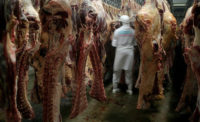On Jan. 25, 2021, a coalition of food safety activist groups and individuals led by Center for Science in the Public Interest (CSPI) petitioned the U.S. Department of Agriculture’s Food Safety and Inspection Service (FSIS) to significantly change course on its approach to regulating Salmonella and Campylobacter.
Specifically, the petition calls for FSIS to:
- issue regulations that would establish enforceable standards that target
- require slaughter establishments to adopt and implement effective supply chain programs;
- and publish the final version of its FSIS Compliance Guideline for Controlling Salmonella and Campylobacter in Poultry.
Targeting Certain Salmonella Strains
CSPI’s petition asserts that FSIS’ current approach to reducing the overall incidence of Salmonella has not had a meaningful effect on reducing human illness rates for Salmonella and Campylobacter infections. CSPI faults FSIS’ current Salmonella performance standards that focus on all forms of Salmonella. CSPI argues this non-specific approach means the most common Salmonella serotypes may be eliminated that are highly prevalent in poultry but the serotypes commonly associated with human illness fail to be addressed. Because of the high prevalence of relatively benign Salmonella isolates, the petitioners argue efforts targeting prevalence alone fail to target the serotypes of greatest risk to consumers.
CSPI’s petition calls for FSIS to identify Salmonella serotypes that are of particular concern to human health, either because of virulence or multi drug resistance, and establish enforceable performance standards. CSPI requests that FSIS deems the most harmful strains to be adulterants and establish a zero-tolerance performance standard for these strains in poultry products.
Supply Chain Controls
In addition to establishing enforceable Salmonella controls, CSPI’s petition requests that FSIS require establishments to adopt supply chain programs similar to those adopted by the FDA. This would mean establishments would have to work with their supply chain to mitigate hazards on raw materials and ingredients and verify those controls have been appropriately applied. Supply chain principles for live food animals is consistent with the existing Hazardous Analysis Critical Control Point (HACCP) framework as it does not mandate a specific measure to control a hazard. Plans could be adopted to ensure raw materials such as live birds are safe and measures were taken addressing identified hazards. Areas for control would include the breeder flock, hatchery, grow out house, bedding, feed, water and transportation.
CSPI asserts that implementation of a supply chain program would expand focus beyond slaughter and processing and provide a critical step in the process — to minimize bacterial contamination in live birds prior to entrance into the slaughter establishment. Campylobacter would likely require its own specific supply chain controls because of the differences in the organisms.
Next Steps
FSIS is accepting public comments on the petition through regulations.gov until April 6. The FSIS Office of Policy and Program Development is currently reviewing the petition and public comments submitted in response to the petition. NP




Report Abusive Comment